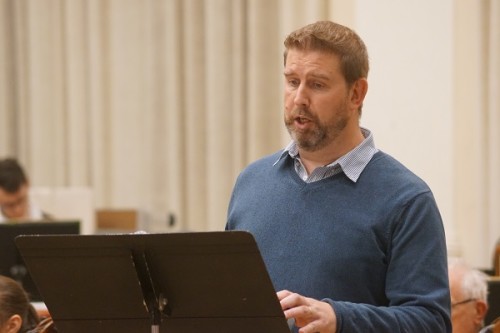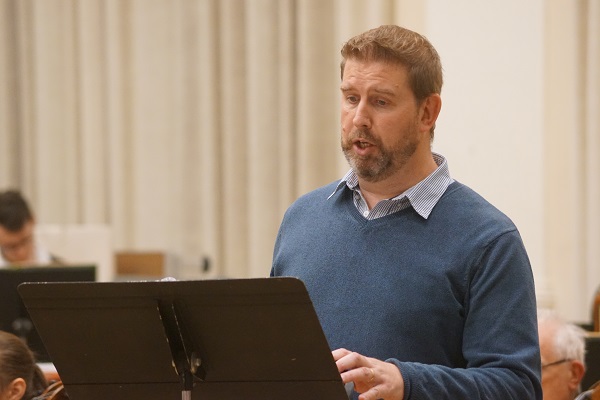 United Kingdom Wagner, Siegfried Act II: Soloists, Rehearsal Orchestra / Anthony Legge (conductor), Henry Wood Hall, London, 21.10.2018. (JPr)
United Kingdom Wagner, Siegfried Act II: Soloists, Rehearsal Orchestra / Anthony Legge (conductor), Henry Wood Hall, London, 21.10.2018. (JPr)

Singers:
Freddie Tong – Alberich
Pauls Putnins – Wanderer
Paul Goodwin-Groen – Fafner
Jonathan Finney – Mime
Elliot Goldie – Siegfried
Claire Egan – Woodbird
I don’t believe I fully celebrated that it was the 60th anniversary of the founding of the Rehearsal Orchestra (click here for their website) in 2017 and will make up for that now. As I have explained before – but worth repeating again – is that when in Edinburgh in 1957 Harry Legge – who was a member of the Royal Philharmonic Orchestra and played with them at the annual International Festival – noticed how many players had nothing to do while waiting for their concerts in the evening. To ‘keep them out of the rain’ he decided to form ‘a rehearsal orchestra to enable them to study the major works they would then hear performed professionally in the evenings!’. With the help of cellist Gillian Halse this was a great success in Edinburgh, and it expanded to a series of weekend courses held every year in London and Manchester. Legge led most of the courses from 1957 to 1999 and through his association with the RPO, Rudolf Kempe became involved and other distinguished guest conductors followed including a number of Sirs; Charles Mackerras, Charles Groves, Andrew Davis, Simon Rattle and – during the RO’s 50th anniversary year – Mark Elder. After Legge died in 2000, Levon Parikian was appointed artistic director and continues his work, together with regular conductors for the London courses – Christopher Adey, Stephen Bell and Timothy Redmond – and Robert Chasey in Edinburgh.
On their website you can read how ‘Since its foundation the Rehearsal Orchestra has never stopped challenging its players with the variety and range of its repertoire. As well as providing essential grounding in the core repertoire for players of all types (facilitated by Harry Legge’s insistence on “getting through the stuff”), the orchestra has given opportunities to play works from outside players’ normal experience.’ Significantly, almost every professional orchestra in the UK could include players who will have played for the RO.
The distinguished baritone Malcolm Rivers – who, though hard to believe, is now in his ninth decade – still remains fully involved in everything the Mastersingers does and as their website (click here) explains they take their inspiration ‘from the celebrated conductor Sir Reginald Goodall, whose pioneering work at English National Opera in the 1970s and ‘80s laid the foundation of great Wagner interpretation in this country.’ Their purpose ‘is to train, mentor and promote British singers in the German Romantic repertoire – mainly in the works of Wagner, but also including those of Richard Strauss. With the direct involvement of Britain’s most senior and distinguished artists, we are nurturing singers who are usually mid-career and who are discovering that their voices are growing into heavier and more dramatic repertoire.’ Although they do not seem to put on as many events as they once did there is still much the Mastersingers are involved in. This includes providing bursaries for coaching singers in particular roles and in 2018 awards went to Pauls Putnins and Julian Close. They also now assist in casting major events, such as the pending new Ring cycle at Longborough and a long-term project is to stage a Ring in English. A feature of recent years has been their masterclasses, workshops, as well as, open rehearsals such as this. Both the RO and Mastersingers are registered charities and their work is dependent on the generosity of corporate benefactors and individuals. If anybody reading this is in a position to support them then I urge you to do so.
A feature of these weekend courses in recent years is a public open rehearsal on Sunday and the RO explains ‘we reserve the right to fall apart, play wrong notes, stop, and generally lose the plot completely – but we very rarely do. By taking away the pressure of performance and placing the focus on the process of exploring a piece of music, we are able to enhance players’ enjoyment and appreciation of the music while simultaneously achieving a high standard of execution.’ The conductor genially guiding them through Wagner in the famous Henry Wood Hall in South London was Anthony Legge, none other than the son of the RO’s founder. He is a vastly experienced accompanist and conductor, and like some contemporaries – such as Lionel Friend and Anthony Negus (who were both there during the day) – Legge deserves to be better known by the wider operagoing public than just a knowledgeable few. He was head of music at English National Opera for 14 years and in 2009 became assistant music director of Opera Australia and was associate conductor for their 2016 Ring. Previously for the Mastersingers he has conducted excerpts of all the Ring operas with the Rehearsal Orchestra and this year they were focussing on Siegfried Act II.
For the very first time I was there for not just the concluding run-through but that open rehearsal in the afternoon. It is not appropriate to review this in the normal way and as before I must praise the talent and commitment of all concerned. Talking to members of the RO I learnt how they come from far and wide for their two days together just for the enjoyment of being able to play such wonderful music. Considering the ad hoc nature of it all what they did was remarkable. During the open rehearsal – and even the subsequent run-through – there was indeed those moments of things falling apart, wrong notes being played, having to stop, or individuals losing the plot, but nothing mattered in the slightest and it did not detract from the excellence of the collective achievement. The best description for what Anthony Legge did is that he nurtured all around him to strive to give of their best.
It is also significant what a loyal following the Mastersingers and the RO has and by the time of the final run-through the half of the Henry Wood Hall not taken up by the full-sized orchestra was again impressively filled by a large throng who had come to hear it. Anthony Legge reminded us how Siegfried Act II had also begun that afternoon at Covent Garden and he said he would see if he could ‘keep the same speed’ with that. It was a surprisingly fleetfooted account of this act and Legge never for one moment indulged his players or singers. The RO proved equal to the poetry of the ‘Forest Murmurs’ and brought a great urgency to the final bars as Siegfried sets off on his epic quest to find Brünnhilde. Almost as an afterthought in the afternoon Legge got the orchestra to play the stormy opening to Act III and what they produced was quite amazing given how little they must have rehearsed this, if at all.
The singers are virtually critic-proof on such an occasion, especially those who did not have much to sing. For a long time I’ll remember the sparks Freddie Tong (Alberich) and Pauls Putnins (Wanderer) struck of one another during their confrontation and how Paul Goodwin-Groen’s baleful tones as Fafner perfectly captured the idea of awaking from a long slumber and singing from the depths of a cave. Claire Egan was a spirited Woodbird egging Siegfried on. Jonathan Finney did not have the security of those around him, but he had his moments as the duplicitous Mime. Creating the biggest impression – because he had most to sing of course – was Elliot Goldie as Siegfried. In 1996 he was the winner of the Inaugural Kathleen Ferrier Award and spent 15 years as a member of the Royal Opera Chorus so – I hope he won’t mind me saying – he is in the second half of his career. Based on his performance Goldie has a secure technique and all the power and stamina required for Wagner. He has a clarion, heroic tenor sound with hints of the Italianate timbre that I certainly prefer for this role and similar ones.
I repeat what I wrote in 2017 how ‘the Mastersingers are going from strength to strength and who knows what they can achieve in the future?’.
Jim Pritchard

Small point, many of the previous RO/Ring sessions were conducted by David Syrus, now retired from Head of Music at Covent Garden.
Indeed, but of course it is not possible to mention all who have been involved with the RO and I have mentioned David in two previous reports of RO’s events like this. Jim